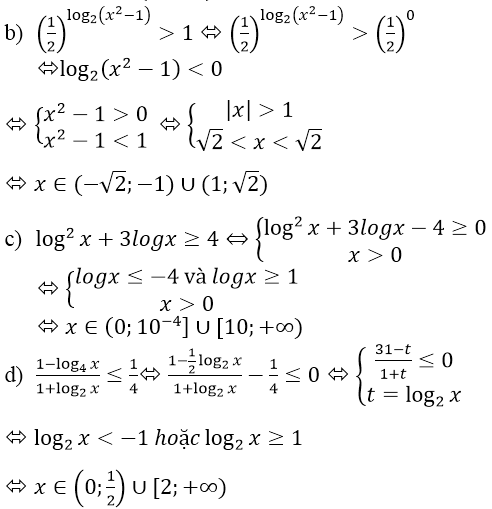Hãy nhập câu hỏi của bạn vào đây, nếu là tài khoản VIP, bạn sẽ được ưu tiên trả lời.

d) Điều kiện x>0. Áp dụng công thức đổi cơ số, ta có :
\(\log_2x+\log_3x+\log_4x=\log_{20}x\)
\(\Leftrightarrow\log_2x+\frac{\log_2x}{\log_23}+\frac{\log_2x}{\log_24}=\frac{\log_2x}{\log_220}\)
\(\Leftrightarrow\log_2x\left(1+\frac{1}{\log_23}+\frac{1}{2}+\frac{1}{\log_220}\right)=0\)
\(\Leftrightarrow\log_2x\left(\frac{3}{2}+\log_22-\log_{20}2\right)=0\)
Ta có \(\frac{3}{2}+\log_22-\log_{20}2>\frac{3}{2}+0-1>0\)
Do đó, từ phương trình trên, ta phải có \(\log_2x=0\) hay \(x=2^0=1\)
Vậy nghiệm duy nhất của phương trình là \(x=1\)
c) Điều kiện x>0, đưa về cùng cơ số 5, ta có :
\(\log_5x^3+3\log_{25}x+\log_{\sqrt{25}}\sqrt{x^3}=\frac{11}{2}\)
\(\Leftrightarrow3\log_5x+3\log_{5^2}x+\log_{5^{\frac{3}{2}}}x^{\frac{3}{2}}=\frac{11}{2}\)
\(\Leftrightarrow3\log_5x+3\frac{1}{2}\log_5x+\frac{3}{2}.\frac{2}{3}\log_5x=\frac{11}{2}\)
\(\Leftrightarrow\frac{11}{2}\log_5x=\frac{11}{2}\)
\(\Leftrightarrow\log_5x=1\)
\(\Leftrightarrow x=5^1=5\) thỏa mãn
Vậy phương trình chỉ có 1 nghiệ duy nhất \(x=5\)

a)
Có:
\(log_2^{\left(2^x+1\right)}.log_2^{\left(2^{x+1}+2\right)}=2\)
\(\Leftrightarrow log_2^{\left(2^x+1\right)}.\left[1+log_2^{\left(2^{x+1}\right)}\right]=2\)
Đặt \(t=log_2^{\left(2^x+1\right)}\), ta có phương trình \(t\left(1+t\right)=2\Leftrightarrow t^2+t-2=0\)
\(\Leftrightarrow\left[{}\begin{matrix}t=1\\t=-2\end{matrix}\right.\Leftrightarrow\left[{}\begin{matrix}log_2^{\left(2^x+1\right)}=1\\log_2^{\left(2x+1\right)}=-2\end{matrix}\right.\)
\(\Leftrightarrow\left[{}\begin{matrix}2^x+1=2\\2^x+1=\dfrac{1}{4}\end{matrix}\right.\Leftrightarrow\left[{}\begin{matrix}2^x=1\\2^x=-\dfrac{3}{4}\left(không-t.m\right)\end{matrix}\right.\Leftrightarrow x=0\)
b)
Với điều kiện \(x>0\), ta có:
\(log.\left(x^{log9}\right)=log9.logx\) và \(log\left(9^{logx}=logx.log9\right)\)
nên \(log\left(x^{log9}\right)=log\left(9^{logx}\right)\)
\(\Rightarrow x^{log9}=9^{logx}\)
Đặt \(t=x^{log9}\), ta được phương trình \(2t=6\Leftrightarrow t=3\Leftrightarrow x^{log9}=3\)
\(\Leftrightarrow log\left(x^{log9}\right)=log3\Leftrightarrow log9.logx=log3\)
\(\Leftrightarrow logx=\dfrac{log3}{log9}\Leftrightarrow x=\dfrac{1}{2}\)
\(\Leftrightarrow x=\sqrt{10}\) (thỏa mãn điều kiện \(x>0\)).
c)
Với điều kiện \(x>0\), lấy lôgarit thập phân hai vế của phương trình đã cho, ta được:
\(\left(3log^3x-\dfrac{2}{3}logx\right).logx=\dfrac{7}{3}\)
Đặt \(t=logx\), ta được phương trình:
\(3t^4-\dfrac{2}{3}t^2-\dfrac{7}{3}=0\)
\(\Leftrightarrow9t^4-2t^2-7=0\Leftrightarrow\left[{}\begin{matrix}t^2=1\\t^2=-\dfrac{7}{9}\left(không-t.m\right)\end{matrix}\right.\Leftrightarrow\left[{}\begin{matrix}t=1\\t=-1\end{matrix}\right.\)
\(\Leftrightarrow\left[{}\begin{matrix}logx=1\\logx=-1\end{matrix}\right.\Leftrightarrow\left[{}\begin{matrix}x=10\\x=\dfrac{1}{10}\end{matrix}\right.\)
d)
Đặt \(t=log_5^{\left(x+2\right)}\) với điều kiện \(x+2>0\), \(x+2\ne1\), ta có:
\(1+\dfrac{2}{t}=t\Leftrightarrow t^2-t-2=0,t\ne0\)
\(\Leftrightarrow\left[{}\begin{matrix}t=-1\\t=2\end{matrix}\right.\Leftrightarrow\left[{}\begin{matrix}log_5^{\left(x+2\right)}=-1\\log_5^{\left(x+2\right)}=2\end{matrix}\right.\Leftrightarrow\left[{}\begin{matrix}x+2=\dfrac{1}{5}\\x+2=25\end{matrix}\right.\Leftrightarrow\left[{}\begin{matrix}x=-\dfrac{9}{5}\\x=23\end{matrix}\right.\)

ĐKXĐ: \(x>0\)
\(\Leftrightarrow\left[{}\begin{matrix}2log_3^2x-log_3x-1=0\\5^x=m\end{matrix}\right.\)
\(\Leftrightarrow\left[{}\begin{matrix}\left[{}\begin{matrix}log_3x=1\\log_3x=-\frac{1}{2}\end{matrix}\right.\\5^x=m\end{matrix}\right.\) \(\Leftrightarrow\left[{}\begin{matrix}\left[{}\begin{matrix}x=3\\x=\frac{1}{\sqrt{3}}\end{matrix}\right.\\5^x=m\end{matrix}\right.\)
Xét pt \(5^x=m\)
- Nếu \(m>5^3=125\Rightarrow\left[{}\begin{matrix}x=3\\x=\frac{1}{\sqrt{3}}\end{matrix}\right.\) ko phải nghiệm của pt đã cho \(\Rightarrow\) phương trình có đúng 1 nghiệm
- Nếu \(m=5^3\Rightarrow\) pt có đúng 1 nghiệm \(x=3\)
- Nếu \(1< m< 5^{\frac{1}{\sqrt{3}}}\) phương trình có 3 nghiệm \(\left\{{}\begin{matrix}x=1\\x=\frac{1}{\sqrt{3}}\\x=log_5m\end{matrix}\right.\)
- Nếu \(5^{\frac{1}{\sqrt{3}}}< m< 5^3\) phương trình có 2 nghiệm: \(\left[{}\begin{matrix}x=3\\x=log_5m\end{matrix}\right.\)
- Nếu \(m=1\Rightarrow\) pt có 2 nghiệm \(\left[{}\begin{matrix}x=3\\x=\frac{1}{\sqrt{3}}\end{matrix}\right.\)
Vậy để pt có 2 nghiệm pb thì: \(\left[{}\begin{matrix}m=1\\5^{\frac{1}{\sqrt{3}}}< m< 5^3\end{matrix}\right.\)
\(\Rightarrow\left[{}\begin{matrix}m=1\\3\le m\le124\end{matrix}\right.\) \(\Rightarrow\) có \(123\) giá trị m thỏa mãn









Ta có: 121 ∈ (100; 125)
Chọn A